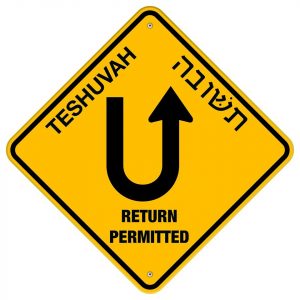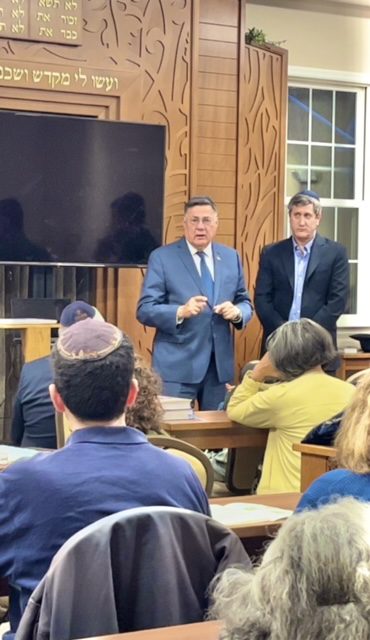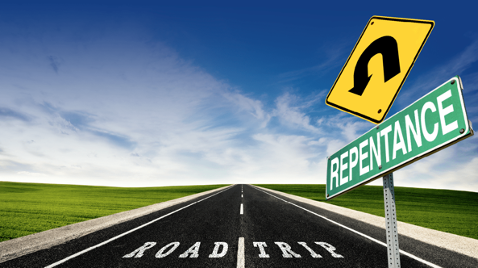By Rabbi Motti Grossbaum
“I shouldn’t have…” “If only I’d known…” Whether it’s an outright wrong, an unwise decision or a missed opportunity, we humans tend to harp on the past, often to the detriment, or even paralysis, of our present endeavors and future potentials.
Some would advise us to let bygones be bygones and get on with our lives. We are physical beings, and the laws of physics (at least as they stand now) dictate that time runs in one direction only. So why not simply put the past behind us, especially since the past is behind us whether we put it there or not?
It’s advice we do not take. We continue to feel responsible for what was, continue to attempt to rewrite our histories, continue to regard our past as something that somehow still “belongs” to us. Something in our nature refuses to let go, refuses to reconcile itself with the one-directional flow of time.
 Yes, we are physical beings; but there is something in us that transcends the physical. Man is an amalgam of matter and spirit, a marriage of body and soul. It is our spiritual self that persists in the belief that the past can be redeemed. It is our connection with the spiritual essence of our lives that grants us the capacity for teshuvah — the capacity to “return” and retroactively transform the significance of past actions and experiences.
Yes, we are physical beings; but there is something in us that transcends the physical. Man is an amalgam of matter and spirit, a marriage of body and soul. It is our spiritual self that persists in the belief that the past can be redeemed. It is our connection with the spiritual essence of our lives that grants us the capacity for teshuvah — the capacity to “return” and retroactively transform the significance of past actions and experiences.
What is this “spiritual essence” with which we seek connection? And how does it enable us to literally change the past? Not just man, but every object, force and phenomenon has both a “body” and a “soul.” A thing’s body is its physical mass, its quantifiable dimensions, its “hard facts.” A thing’s soul is its deeper significance — the truths it expresses, the function it performs, the purpose it serves.
By way of example, let us consider the following two actions: in a dark alleyway, a knife-wielding gangster attacks a member of a rival gang; a hundred yards away, a surgeon bends over a sedated patient lying on the operating table. The “body” of these two actions are quite similar: one human being takes hold of a sharp metal object and slices open the belly of a second human being. But an examination of the “soul” of these two events—the desires that motivate them, the feelings that suffuse them, the aims they seek to achieve—reveals them to be vastly different deeds.
In other words, man is a spiritual creature in that he imparts significance to his deeds and experiences. Things don’t just happen — they happen for a reason, they mean something, they further a certain objective. The same event can therefore mean different things to different people; by the same token, two very different events may serve the same purpose and elicit identical feelings, imbuing them with kindred souls despite the dissimilarity of their bodies.
The body of our lives is wholly subject to the tyranny of time — the “hard facts” cannot be undone. A missed flight cannot be unmissed; a harsh word uttered to a loved one cannot be unspoken. But the soul of these events can be changed. Here we can literally travel back in time to redefine the significance of what occurred.
You oversleep, miss that flight, and never show up for that important meeting. The initial significance of that event: your boss is furious, your career suffers a serious setback, your self-esteem plummets. But you refuse to “put the past behind you.” You dwell on what happened. You ask yourself: What does it mean? What does it tell me about myself? You realize that you don’t really care for your job, that your true calling lies elsewhere. You resolve to make a fresh start, in a less profitable but more fulfilling endeavor. You have reached back in time to transform that slumbered hour into a wake-up call.
Or you have an argument, lose your cool, and speak those unforgivable words. The next morning you’re friends again, agreeing to “forget what happened.” But you don’t forget. You’re horrified by the degree of your insensitivity; you agonize over the distance that your words have placed between the two of you. Your horror and agony make you realize how sensitive you truly are to each other, how much you desire the closeness of the one you love. You have reached back in time to transform a source of distance and disharmony into a catalyst for greater intimacy and love.
On the material surface of our lives, time’s rule is absolute. But on its spiritual inside, the past is but another vista of life, open to exploration and development with the transformative power of teshuvah.
This Yom Kippur, let us reflect on the challenges, pains and the “pulling back of our slingshots” in the last year to ensure that they serve as stimulants and inspirations for collective good health and much personal growth in the year ahead.
Shana Tova!
Rabbi Motti Grossbaum is director of programming and development at Village Chabad Center for Jewish Life & Learning in East Setauket.



 Yes, we are physical beings; but there is something in us that transcends the physical. Man is an amalgam of matter and spirit, a marriage of body and soul. It is our spiritual self that persists in the belief that the past can be redeemed. It is our connection with the spiritual essence of our lives that grants us the capacity for teshuvah — the capacity to “return” and retroactively transform the significance of past actions and experiences.
Yes, we are physical beings; but there is something in us that transcends the physical. Man is an amalgam of matter and spirit, a marriage of body and soul. It is our spiritual self that persists in the belief that the past can be redeemed. It is our connection with the spiritual essence of our lives that grants us the capacity for teshuvah — the capacity to “return” and retroactively transform the significance of past actions and experiences.


